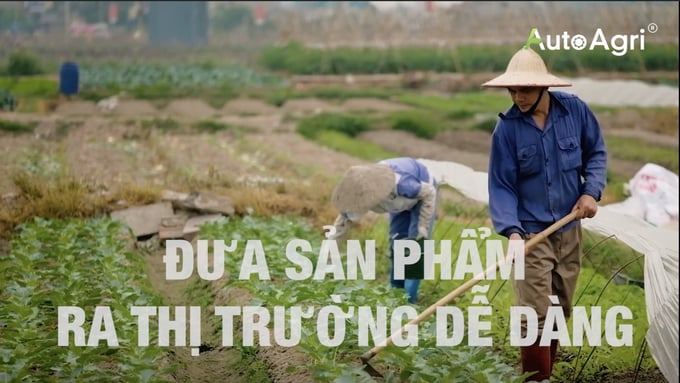November 26, 2025 | 06:25 GMT +7
November 26, 2025 | 06:25 GMT +7
Hotline: 0913.378.918
November 26, 2025 | 06:25 GMT +7
Hotline: 0913.378.918

Ms. Nguyen Thi Thanh Thuc, CEO of AutoAgri Software Technology JSC.
At the Promoting digitalization in agro-product and food traceability forum held in Hanoi and Hochiminh city, February 28, according to Ms. Nguyen Thi Thanh Thuc, CEO of AutoAgri Software Technology JSC, there are three major actors in the agricultural – food products value chain; and they are the state sector, the residential and business areas, and the consumers.
The digitalization of agricultural products – food traceability offers the benefits of transparency thanks to multimedia and modern technology; it also allows for a more streamlined integration process where supply chains can connect with ease through a multitude of forms including photos, videos automatic reports, etc. Moreover, digitalization also helps promote and protect the producers’ interest as well as cut down on costs through the use of smartphone applications.
To effectively implement agricultural digitalization, the state sector must establish a detailed process including details for governmental bodies, requirements for actors in the value chain such as the producer, the buyer, the transporter, the seller, etc.
On the other hand, softwares play in important role in replacing manual paperwork; subsequently, they must be proportionate to the investment capacity of each actor in the value chain. These softwares are further reinfored by appropriate digital devices including transmission equipment, internet devices, computers, mobile phones, cameras and so on.

On the other hand, softwares play in important role in replacing manual paperwork.
AutoAgri, a product of AutoAgri Software Technology JSC, is a digital platform for traceability, value chain linkage and integration. Ms. Nguyen Thi Thanh Thuc explains that the company’s product can replace traditional notebooks with mobile phone applications.
Additionally, the software acts as an accessible accounting application so that users can manage clients, employees, assets, revenues, profits as well as export reports on demand from their mobile devices. AutoAgri’s users can also monitor and filter data online using the application. The AutoAgri’s personal database is strictly monitored by state security agenciesto ensure the highest level of protection.
AutoAgri has been deployed, and subsequently linked cooperative alliances, Farmers’ Association and small farming households across 25 provinces and cities. Ms. Nguyen Thi Thanh Thuc reported that there are currently 27.535 registered accounts with 78.919 different online records.
Most notably, this software has provided a platform for agricultural digitalization for the Laos Ministry of Agriculture and Forestry. A Memorandum of Understanding has been signed to deploy AutoAgri in 5 Laos provinces which will contribute to the international 4.0 technology revolution.
On the other hand, the deployment of AutoAgri was faced with several challenges. The majority of the state and business sectors are reluctant to technological changes. Many stakeholders also fail to comply with regulations regarding product labels, product origins, etc. in the process of digitalization.
Furthermore, digitalization of the agricultural product chain is not accessible to small Vietnamese businesses; digital platforms are mostly exclusive to foreign or state businesses. In addition, Vietnamese farmers are not open to the idea of establishing product brands.
Ms. Nguyen Thi Thanh Thuc also made a few recommendations based on her experience in the digitalization of agricultural product chain: the government must deploy programs to promote initiatves in the field of agricultural digitalization. Local governments can also contribute to the effort by enriching the national agricultural resource database.

(VAN) Deputy Minister Nguyen Quoc Tri emphasized the determination to prevent violations at CoP20, sharing enforcement results and commitments to strengthen cooperation with the international community in the coming period.

(VAN) In addition to strengthening the relationship between schools and enterprises, the Aus4Skills project expands opportunities for female students and people with disabilities to work in the transport and logistics sector.

(VAN) Nghe An is preparing policy, technical, and resource steps to participate in the forest carbon credit market.
/2025/11/25/1648-2-110733_532.jpg)
(VAN) From 2011 to 2023, Ca Mau province lost approximately 6,200 ha of coastal land and protection forests due to erosion, threatening many residential areas, infrastructure facilities, and production zones.

(VAN) Quang Ngai holds strong potential for carbon credits but needs a clear legal and policy framework to secure sustainable revenue from this resource.

(VAN) With its diverse ecosystem, Phu Quoc National Park plays a vital role in environmental protection and biodiversity conservation and serves as the core zone of the Kien Giang World Biosphere Reserve.

(VAN) Cooperation activities under the Aus4Skills program focus on: logistics professional development, competency-based training and assessment (CBTA), leadership innovation, and digitalization.